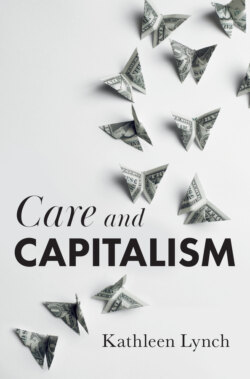Читать книгу Care and Capitalism - Kathleen Lynch - Страница 31
Racialized care
ОглавлениеWhile there is an internal, classed care economy within most wealthy countries, much of care labour supplied to the rich North/West of the world involves mining the care ‘gold’ (Hochschild 2002) of other countries, especially that of poorer countries. Care has become an export, not unlike other raw materials,3 often extracted from former colonies, especially from women (Hochschild 2003; Mahadaven 2020), a twenty-first-century ‘mining’ of poorer parts of the world to supply the needs of the rich. In the United States, women from Mexico, Central America and the Caribbean account for much of the growth in domestic workers, cleaners, personal care workers and childcare workers since 2000 (Duffy 2020), while nurses from the Philippines,4 and to a lesser degree India (Brush and Vasupuram 2006; Garner, Conroy and Bader 2015; WHO 2018), fill many nursing positions in the UK. Although men comprise the majority of migrants globally,5 women comprise the majority of migrants to Northern, Southern and Western Europe and half of those to the US (IOM 2020), a very large proportion of whom are working in care services, including in the highly unregulated home care and domestic sectors (Misra 2003; Da Roit, González Ferrer and Moreno-Fuentes 2013). These globalized care workers do benefit from their employment, as do their families in the sending countries through emigrant remittances. However, their involuntary migrations often leave care deficits behind in their country of origin (Anderson 2000; Hochschild 2002).6 When women with young children migrate without their families, it is other women who are left behind who take on informal family caring, while the women who migrate suffer the loss of intimacy of their own families (Anderson 2000).
Migrant care workers and domestic workers generally work without labour protections. They share common challenges including irregular hours of work and precarious working conditions, low wages, problems with immigration status and experiences of discrimination (Hondagneu-Sotelo 2001; Glenn 2010; Romero 2018). Although the ILO convention on domestic work (Domestic Workers Convention, 2011, No. 189),7 offers protections for domestic workers, it has only been ratified by thirty-one countries, and is not ratified by several European countries (including the UK, France, Austria, Spain, Denmark, Norway and the Netherlands), by Saudi Arabia, by the United Arab Emirates or by the Federal government of the USA. For those who migrate to do care and domestic work, there are also emotional and personal challenges in adapting to living in intimate family settings, especially where they do not share the family’s cultural values or practices (Lutz 2016). Paid care work is not just classed and gendered, therefore; it is also racialized, especially given the role that migrant labour plays in care provision.
